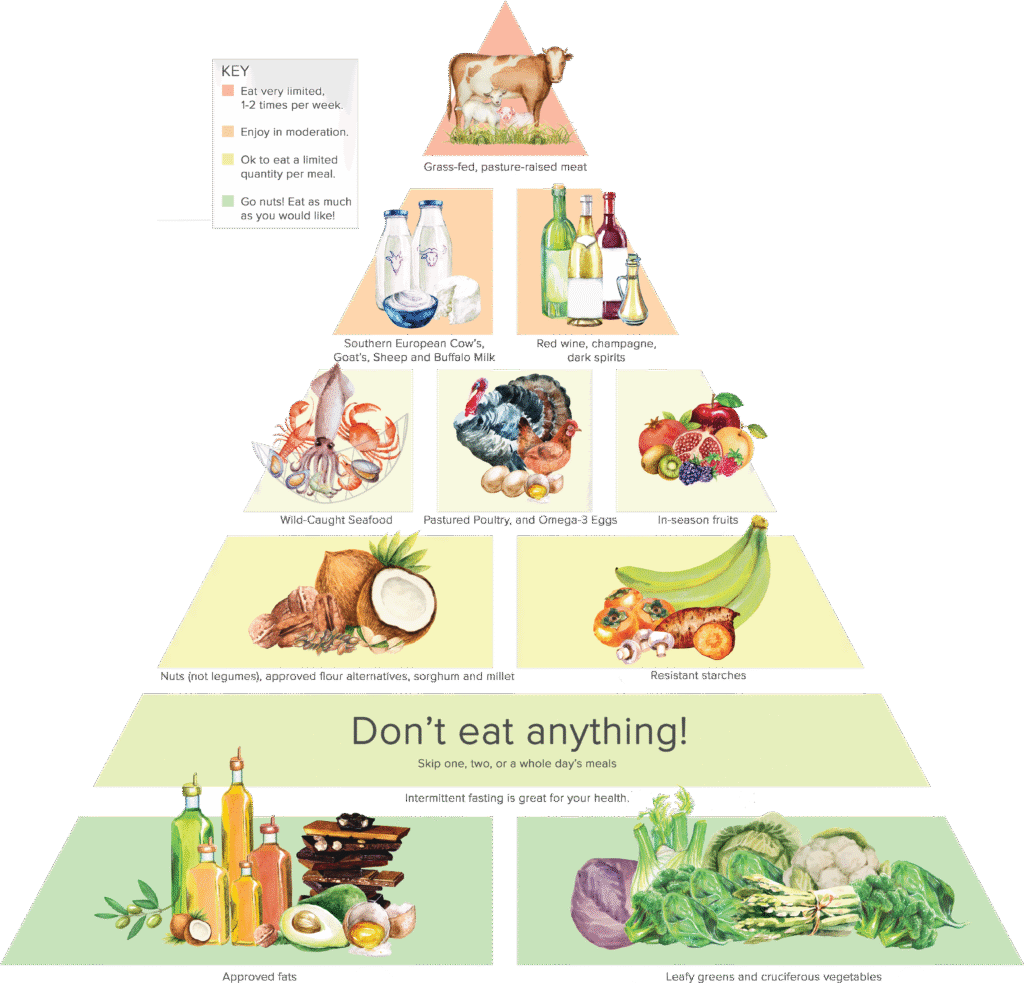
table of contents
- Who is Dr. Steven Gundry: Books | Supplements
- Dr. Steven Gundry’s longevity diet: Microbiome | Food pyramid | Nutrition habits
- Dr. Gundry: “Eat short live long!”
- Best way to incorporate Steven Gundry’s system
Who is Dr. Steven Gundry?
Steven Gundry, born in 1950, is an American physician and former heart surgeon known for his theories on diet, gut health, and aging. He previously led cardiothoracic surgery at Loma Linda University Medical Center before shifting his focus to preventative health and nutrition.
With his newest release, The Gut‑Brain Paradox: Improve Your Mood, Clear Brain Fog, and Reverse Disease by Healing Your Microbiome, published on April 15, 2025, Dr. Gundry has now authored a total of 10 books. These include The Plant Paradox and The Longevity Paradox – focusing on how inflammation, lectins, and an unbalanced gut microbiome may contribute to age-related disease. His views are considered controversial by some, and that’s likely why people sometimes ask: Is Steven Gundry a real doctor? The answer is: yes, very much so – with decades of medical training and experience behind him.ining and experience behind him.
Through his company Gundry MD, he promotes supplements and wellness products aligned with his philosophy. This business model has drawn both interest and skepticism, prompting questions like is Dr. Steven Gundry legitimate? and is Steven Gundry credible? The same thing you’ll find looking into Steven Gundry MD reviews—they’re mixed but mostly positive.
While reviews of Steven Gundry are mixed, most are positive and mention feeling healthier or more energized. At the same time, some criticism has come from parts of the medical community. Several experts believe his claims need stronger support from independent scientific research. This mix of enthusiastic users and skeptical professionals helps explain why the debate around Gundry continues. Still, he’s clearly had an impact on how people talk about healthy aging and lifestyle choices.
Dr. Steven Gundry books
Steven Gundry has as mentioned already written several books on nutrition, gut health, energy, and aging. His work is based on the idea that many chronic health issues stem from imbalances in the gut and the body’s reaction to certain plant proteins, such as lectins. Below you will find an overview of Steven Gundry books in order:
| Title | Year | Description |
|---|---|---|
| Dr. Gundry’s Diet Evolution | 2008 | Early work on gene-friendly weight loss through diet. |
| The Plant Paradox | 2017 | Introduces the idea that lectins can harm the gut and promote disease. |
| The Plant Paradox Cookbook | 2018 | 100 lectin-free recipes based on the main book. |
| The Plant Paradox Quick & Easy | 2019 | 30-day plan with simple meals and guidance. |
| The Plant Paradox Family Cookbook | 2019 | Family-focused lectin-free recipes for various needs. |
| The Longevity Paradox | 2019 | How to age well by supporting the gut and reducing inflammation. |
| The Energy Paradox | 2021 | Tackles fatigue by improving mitochondrial and gut function. |
| Unlocking the Keto Code | 2022 | Explains keto & ketosis by focusing on ketone signaling and mitochondrial uncoupling. |
| Gut Check | 2024 | Focuses on the microbiome’s effect on health and metabolism. |
| The Gut-Brain Paradox | 2025 | Explores the link between gut health and brain function. |
In addition to his 10 books, Dr. Steven Gundry hosts a podcast where he explores topics related to his health philosophy, often joined by experts in nutrition and medicine. He also appears in interviews and public talks, and there are numerous videos online where he explains key concepts like leaky gut, inflammation, immune health, and aging. These make his approach to diet and supplements easy to understand and accessible to a wide audience.
Many of his videos are educational and explanatory, making his approach to diet and supplements easy to understand and accessible to a wide audience. He shares practical advice on what to eat and what to avoid — including clear lists of Steven Gundry foods to avoid, such as sugar, certain grains, and foods high in lectins. He also provides detailed guidance on nuts, a topic often covered in his content on gut health.
Dr. Gundry & Nuts
According to Dr. Gundry, nuts like macadamias, pistachios, and walnuts are generally beneficial, while peanuts, amonds and cashews appear on his list of foods to avoid due to their lectin content and potential effects on digestion.
Dr. Steven Gundry supplements
Steven Gundry MD own products include a variety of supplements aimed at supporting gut health, reducing inflammation, improving mitochondrial function, and strengthening the immune system—all central to his approach to health, aging, and disease prevention.
Among Dr. Gundry’s supplements — which he considers essential additions — you’ll find vitamin D3, magnesium, vitamin C, omega-3, and many more aimed at supporting energy, immune health, and healthy aging.
Dr. Steven Gundry highlights vitamin D3 as one of the most important supplements and often recommends daily doses of 5,000 IU, and up to 10,000 IU in specific cases. According to him, D3 plays a key role in maintaining the gut lining, supporting beneficial microbiota, and reducing chronic inflammation.
At Purovitalis, we offer a high-absorption liposomal vitamin D3 – designed for those looking to support their immune system and gut health in an effective and science-backed way.
Related: The link between vitamin D3 and the immune system
Dr. Steven Gundry’s longevity diet
Dr. Steven Gundry developed his Longevity diet after seeing patients improve chronic conditions through dietary changes. Shifting from heart surgery to prevention, he focused on how gut health, inflammation, and mitochondria affect aging—insights that shaped his Longevity Paradox approach, his supplement line, and ongoing research at his private clinic where he continues to test and refine nutrition-based strategies for healthy aging.
Support the gut microbiome
Gundry emphasizes feeding beneficial gut bacteria through foods rich in polyphenols and prebiotic fiber. This includes:
- Cruciferous vegetables (e.g., broccoli, Brussels sprouts)
- Leeks, onions, and Jerusalem artichokes
- Limited fruit (especially berries and pomegranate)
Minimize lectins
A central idea in Gundry’s work is that lectins—a type of plant protein found in beans, grains, and nightshades—can damage the gut lining and cause inflammation. The longevity diet therefore recommends:
- Pressure-cooking legumes to reduce lectins
- Avoiding unfermented soy, wheat, and conventional corn
- Eliminating nightshades
What are nightshades?
Nightshades are a group of plants in the Solanaceae family, which include tomatoes, potatoes, eggplants, bell peppers, chili peppers, and even goji berries. They contain natural compounds like solanine and lectins that, in some individuals, may irritate the gut or contribute to inflammation.
Also read: The Connection Between Gut Health and Aging
Support mitochondrial health
Gundry stresses the importance of mitochondrial health for energy production and longevity. Recommended foods:
- Healthy fats (avocado, olive oil, macadamia nuts)
- Wild-caught seafood rich in omega-3s
- Low-sugar, polyphenol-rich foods like green tea and dark chocolate
Time-restricted eating and fasting
Intermittent fasting is encouraged to give the digestive system a break and boost cellular repair. He often suggests:
- Skipping breakfast or eating within a 6–8 hour window
- Occasional longer fasts to stimulate autophagy
Dr. Gundry: “Eat short live long!”
Steven Gundry has followed an OMAD diet during the winter season for 23 years. He chooses winter based on an evolutionary perspective, where food would naturally have been more limited. By eating only once a day, he experiences improved mental clarity, stable energy, and better weight control.
OMAD diet
The One Meal A Day diet is a form of intermittent fasting where a person eats all their daily calories in a single meal, typically within a one-hour window, and fasts for the remaining 23 hours.
He also explains how many of his clients benefit from this approach, reporting better digestion, reduced inflammation, improved blood sugar balance, and lower levels of insulin growth factor 1 (IGF-1), a hormone linked to aging and increased disease risk. It’s not about starvation, but about giving the body time to repair and renew itself through natural processes like autophagy.
The Gundry food pyramid
At the base of the pyramid are healthy fats like extra virgin olive oil, avocado, and walnut oil. Next come leafy greens and cruciferous vegetables such as broccoli, cauliflower, and cabbage. Above that are small amounts of nuts (like macadamias and coconut), coconut and almond flour, and lectin-free grains such as sorghum and millet. Resistant starches like green bananas and plantains are also included. Then come moderate portions of wild-caught fish, pastured poultry, and omega-3 eggs. Fruit should be eaten in small amounts and only when in season — green bananas and mangoes are preferred. Avocados are allowed year-round.
It’s worth noting that Gundry’s food pyramid includes both fasting and alcohol, which sets it apart from many other dietary models. While fasting is seen as essential for giving the body regular breaks to repair itself, reduce inflammation, and stabilize insulin levels — it’s not optional, but a key part of the system. Alcohol, in contrast, is allowed in moderation. Gundry permits small amounts of red wine, champagne, or dark spirits up to 1–2 times per week, mainly due to their polyphenols and potential benefits for heart health.
Source: Gundry MD. Official website

Best way to incorporate Steven Gundry’s system
Dr. Steven Gundry’s philosophy centers around supporting the body’s natural ability to repair itself through diet, fasting, and by taking care of the gut and mitochondria. It’s not about following every single rule — it’s about finding what works in your daily life and listening to your body.
Below is a quick overview of his key principles and how supplements can support them.
| Gundry principle | Practical tip | Matching Purovitalis supplement |
|---|
| Support the gut microbiome | Eat prebiotic fiber from leeks, onions, and Jerusalem artichokes | Liposomal vitamin D3 Supports gut lining and immune function |
| Reduce inflammation | Use olive oil as your main fat, avoid refined seed oils | Liposomal resveratrol Polyphenol with anti-inflammatory properties |
| Avoid lectins | Skip nightshades (tomato, eggplant, peppers), pressure-cook legumes |
| Boost mitochondrial function | Eat green tea, dark chocolate, and healthy fats like avocado and olive oil | Liposomal NMN Supports energy production and mitochondrial health |
| Eat fewer meals | Try 8:16 time-restricted eating or OMAD a few days a week | Liposomal Spermidine Supports autophagy and cellular renewal during fasting |
| Limit sugar and fruit | Focus on berries and pomegranate, avoid added sugar | Berberine Balance Helps maintain healthy blood sugar levels and insulin sensitivity |
| Eat seasonally | Choose local vegetables that align with the seasons |
Tune in, try it out – and take what works for you
At its core, Dr. Gundry’s message is about giving your body better conditions to stay healthy. His podcasts and videos are practical, engaging, and easy to follow. We recommend tuning in and exploring his ideas — there’s often a mix of expert insights and hands-on advice you can try right away.
Our tip
Stay curious. Try reducing lectins for a week, or test out time-restricted eating. See what works for your body and brings you more energy or balance.
We’re personally looking forward to reading his latest book The Gut-Brain Paradox, where he explores the link between gut health and brain function. It’ll be interesting to see how his thinking continues to evolve — and what new ideas we can all take with us.
References
- Gundry MD. Official website of Dr. Steven Gundry and Gundry MD [Internet]. Beverly Hills (CA): Gundry MD; [cited 2025 Jul 18]. Available from: https://www.gundrymd.com
- Wikipedia contributors. Steven Gundry [Internet]. Wikipedia, The Free Encyclopedia; [cited 2025 Jul 18]. Available from: https://en.wikipedia.org/wiki/Steven_Gundry
- Gundry S. Dr. Steven Gundry – Official Website [Internet]. Palm Springs (CA): DrGundry.com; [cited 2025 Jul 18]. Available from: https://drgundry.com/












